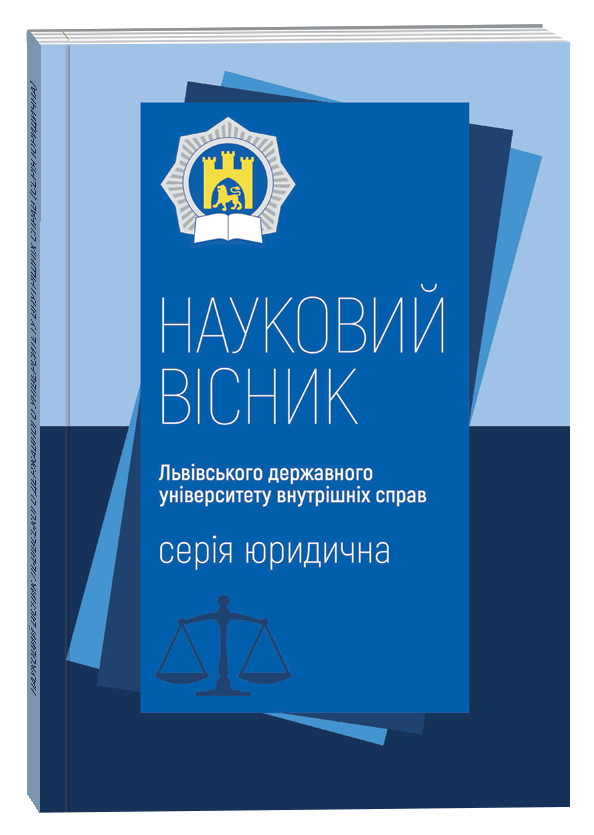HISTORY, ESSENCE AND CONCEPT OF THE MODEL OF IMPLEMENTATION OF LAW ENFORCEMENT ACTIVITIES BASEDON FORECASTS (PREDICTIVE POLICING)
DOI:
https://doi.org/10.32782/2311-8040/2023-3-18Keywords:
model, law enforcement activity, forecasting, essence of forecasting, concept of forecasting, proactiveness, prevention, criminal activityAbstract
A theoretical analysis of foreign studies devoted to the conceptual and scientific-practical aspects of the formation, essence and concept of the model of law enforcement activities based on forecasts (Predictive Policing) was carried out. It was established that the term “predictive policing” (Predictive Policing) is applied to a number of complex analytical tools and law enforcement practices, the formation and development of which dates back to the 2000’s, and has today become widely used in law enforcement practice in the United States, Europe, and the United States. Britain. It is summarized that the model of law enforcement activity reveals regularities in criminogenic information about criminal activity in order to predict trends with a certain degree of probability (when, where and what kind of criminal event may occur, who may be involved in it, who will be the next victim, etc.). Application of computer analysis, various statistical techniques, criminology theory, capabilities of geoinformation systems to such information allows forecasting to improve situational awareness. Such awareness allows more rational use of limited law enforcement resources with a preventive goal (to prevent the spread of crime). It has been established that forecasting algorithms are built on the basis of analytical processing of recorded events and factors, which constitute large amounts of established data that can be analyzed. It was found that the content of the concept of the model of law enforcement activities of the police based on forecasts (Predictive Policing) consists of activities related to the use of historical information of a criminogenic nature to develop as patio-temporal forecast of places of concentration of criminal activity and predict illegal behavior of persons who may become offenders, with the aim of targeted application of preventive measures.
References
Мовчан А. Інформаційно-аналітична робота в оперативно-розшуковій діяльності Національної поліції : навчальний посібник. Львів : ЛьвДУВС, 2017. 244 с.
Про Комплексний стратегічний план реформування органів правопорядку як частини сектору безпеки і оборони України на 2023–2027 рр. : Указ Президента України № 273/2023. URL: https://www.president.gov.ua/documents/2732023-46733 (дата звернення: 02.06.2023).
Великий тлумачний словник сучасної української мови : 250 000 / уклад. та гол. ред. В. Бусел. Київ ; Ірпінь : Перун, 2005. VIII. 1728 с.
Орлов Ю. Планування кримінологічне. Вісник Асоціації кримінального права України. 2016. № 2 (7). С. 358–360.
Predictive policing: The role of crime forecasting in law enforcement operations / W.L. Perry et al. Washington, DC : Rand Corporation, 2013.
Perry W.L. Predictive Policing: The Role of Crime Forecasting in Law Enforcement Operations. RAND Corporation, 2013.
Zach Friend. Predictive Policing: Using Technology to Reduce Crime. FBI Law Enforcement Bulletin / Federal Bureau of Investigation. Retrieved 8 February 2018.
Rienks Rutger. Predictive Policing: Taking a Chance for a Safer Future. 14 Jul, 2015.
Богінський О. Роль і місце кримінальної розвідки в сучасних моделях стримування злочинності. Право і безпека. 2017. № 4 (67). URL: http://dspace.univd.edu.ua/xmlui/handle/123456789/3081?show=-full&locale-attribute=uk (дата звернення: 02.06.2023).
Proactive Policing: Effects on Crime and Communities. National Academies Press. Washington, DC. URL: https://www.nap.edu/read/24928/chapter/4#73 (дата звернення: 02.06.2023).
Lau Tim. Predictive Policing Explained. Attempts to forecast crime with algorithmic techniques could reinforce existing racial biases in the criminal justice system. URL: https://www.brennancenter.org/our-work/research-reports/predictive-policing-explained (дата звернення: 02.06.2023).
Algorithmic prediction in policing: assumptions, evaluation, and accountability / Lyria Bennett et al. Policing and Society : International Journal of Research and Policy. URL: https://www.tandfonline.com/doi/pdf/10.1080/10439463.2016.1253695 (дата звернення: 02.06.2023).









